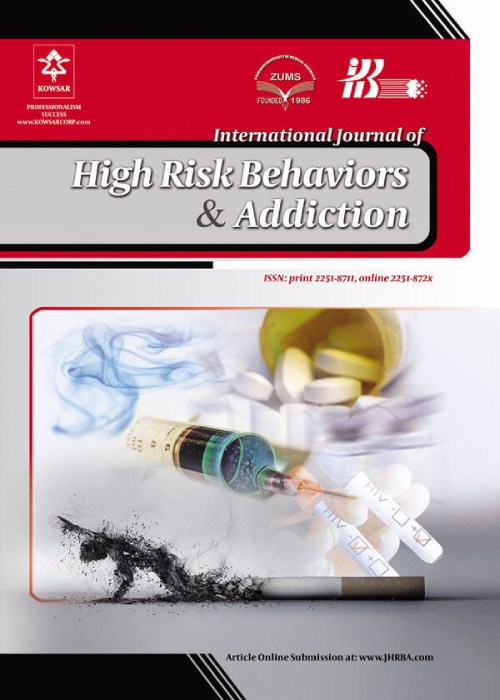Substance Abuse Related Predictors in Soldier's Suicidal Attempt
Author(s):
Abstract:
Background
Military populations are at high risk for suicidal behavior. There are several well-known predictors for suicide and a few studies have evaluated the effect of substance abuse patterns on suicide in military environments.Objectives
This study was designed to determine substance abuse related factors that predict suicidal attempts in soldiers by concerning confounding factors. The importance of determining these risk factors is that they allow us to identify high-risk people, who should receive intensive monitoring and attempts should be made to reduce modifiable predictors.Patients and
Methods
Through a cross sectional research, 3960 soldiers were selected by cluster sampling from army service garrisons in 12 regions of Iran during 2010. Data were gathered by demographic and military environment information, Texas Christian University (TCU) drug screen II and the Addiction Severity Index (ASI). The dependent variable was suicidal attempt during the military service course and the independent variables were demographic (age, education, job prior to service course and life situation), substance abuse related (the age at first substance abuse experience, alcohol abuse, tobacco abuse, ecstasy abuse, analgesics abuse, opium abuse, marijuana abuse, multi drug abuse and history of drug intoxication (subgroup analysis)), psychosocial (history of anxiety disorder, depression, obsessive compulsive disorder, personality disorder, child abuse, HIV risk behavior, physical fight) and military service-related factors (service place satisfaction, bad relationship with commanders, always having feelings of loneliness, combat situation, distance from home). Information was decoded in the SPSS 21 software and a backward logistic regression analysis was performed.Results
The majority of soldiers with mean age of 21.8 (SD = 2.4) years were single (82.1%), employed (54.5%) and had a low level of education or were illiterate (71.1%). In total, 296 (7.5%) soldiers had suicidal attempts in their military service course. Predictors of suicidal attempt were education level of under diploma, age of under 18, being abused during childhood, having a history of human immunodeficiency virus (HIV) high risk behavior, anxiety disorder, depression disorder and service place dissatisfaction. By controlling known confounders, substance abuse-related predictors of suicidal attempt were first experience of substance abuse before the age of 15 (OR = 1.48, P = 0.023), abusing opium (OR = 3.92, P = 0.000), alcohol (OR = 1.39, P = 0.023) and multi substance abuse (OR = 1.37, P = 0.029).Conclusions
By intensive monitoring of the situation of substance abuse among soldiers, commanders can reduce modifiable predictors of suicidal attempt.Language:
English
Published:
International Journal of High Risk Behaviors and Addiction, Volume:6 Issue: 1, Mar 2017
Page:
9
magiran.com/p1671823
دانلود و مطالعه متن این مقاله با یکی از روشهای زیر امکان پذیر است:
اشتراک شخصی
با عضویت و پرداخت آنلاین حق اشتراک یکساله به مبلغ 1,390,000ريال میتوانید 70 عنوان مطلب دانلود کنید!
اشتراک سازمانی
به کتابخانه دانشگاه یا محل کار خود پیشنهاد کنید تا اشتراک سازمانی این پایگاه را برای دسترسی نامحدود همه کاربران به متن مطالب تهیه نمایند!
توجه!
- حق عضویت دریافتی صرف حمایت از نشریات عضو و نگهداری، تکمیل و توسعه مگیران میشود.
- پرداخت حق اشتراک و دانلود مقالات اجازه بازنشر آن در سایر رسانههای چاپی و دیجیتال را به کاربر نمیدهد.
In order to view content subscription is required
Personal subscription
Subscribe magiran.com for 70 € euros via PayPal and download 70 articles during a year.
Organization subscription
Please contact us to subscribe your university or library for unlimited access!


